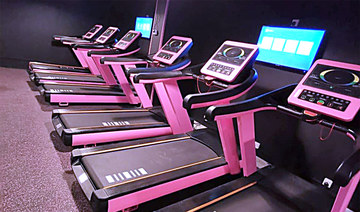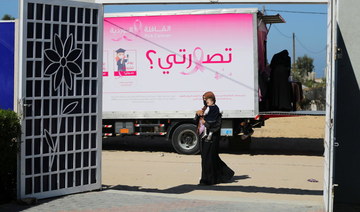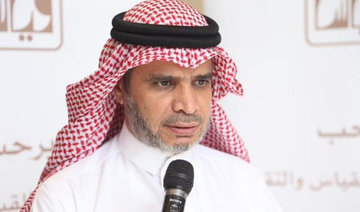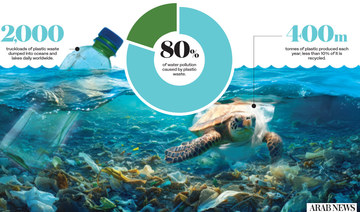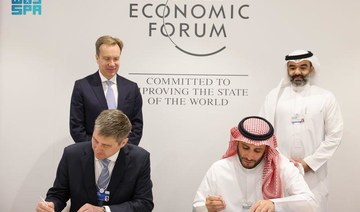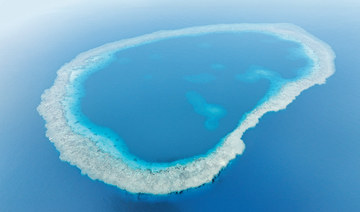RIYADH: Breast cancer has long been known as one of the greatest health risks for women, with incidence rates of up to 30 percent in Saudi Arabia, according to some studies.
However, less well known is that men can also fall victim to the disease.
While cases among males are rare, the illness follows the same path as in women, with cells in the breast growing abnormally, dividing rapidly and then spreading to lymph nodes and other parts of the body, often with devastating consequences.
The risks of the disease to both women and men are being highlighted during Breast Cancer Awareness Month, which is observed every October as part of an international health campaign.
Global events include walks and runs, and the lighting of city landmarks in pink — the color used by campaigners worldwide to highlight their stand against breast cancer. Joining the campaign, major buildings in Riyadh have been illuminated in pink every night, while other cities across the Kingdom have also taken part in activities to raise awareness.
Thirty female cyclists rode around the streets of Jeddah dressed in pink to highlight the importance of early detection and treatment of the illness, and to offer support to survivors. The initiative was organized by Al-Murjan investment group in cooperation with the Saudi Ministry of Health and the Brave Cyclist club.
The Saudi government and private sector also will launch a series of initiatives, including educational exhibitions, lectures, mall drives, sports activities and mammogram screenings to promote awareness of the disease.
Arab News, the leading English daily in the region, has placed a pink ribbon on its masthead to highlight the important role that screening plays in combating the devastating disease.
According to a World Health Organization 2018 report, the incidence of breast cancer among females in Saudi Arabia stands at almost 30 percent. The illness is more common among over-40s, the health ministry said.
Early detection of breast cancer can significantly improve chances of recovery in both women and men, experts say.
Dr. Osama Halaweh, a hematologist and medical oncologist at Johns Hopkins Aramco Healthcare, told Arab News: “Breast cancer is the most common cancer in women, but it does occur in men as well, though rarely. But awareness of the possibility is important. Since there is no screening for breast cancer in men, it is usually detected at a later stage when the lymph nodes are involved.”
Dr. Amer Mahmood, associate professor and molecular biologist at the College of Medicine in King Saud University, said: “Breast cancer is rare in men and usually happens in those over 60, but can occasionally affect younger men. About one in every 100 breast cancers diagnosed in the US is found in a man.”
Common symptoms of breast cancer in men a lump or swelling in the breast, irritation or dimpling of the skin, nipple discharge or pain in the nipple area, he added.
Mahmood said that early diagnosis dramatically improves the chances of a cure. Treatment typically involves surgery to remove the breast tissue. Other treatments, such as chemotherapy and radiation therapy, also may be recommended.
While the exact cause of breast cancer in men is not known, several factors increase the likelihood of developing the disease, he said.
Some men inherit abnormal, or mutated, genes from their parents, putting them at a greater risk of developing breast and prostate cancers. Other conditions that increase the level of oestrogen in the body will also add to the breast cancer risk.
However, male breast cancer is often overlooked. In 2009, the advocacy groups Out of the Shadow of Pink, A Man’s Pink, and the Brandon Greening Foundation for Breast Cancer in Men joined forces to have the third week of October labeled Male Breast Cancer Awareness Week.
Studies in Europe and the US have shown that one in eight women will develop breast cancer during their lifetime.
Halaweh said that the illness in women can be hereditary in about 5 percent of cases, so genetic testing is important to determine personal and family risk.
“Currently, there is not sufficient knowledge on the causes of breast cancer, but there is knowledge of risk factors that increase the possibility of developing the disease. So prevention and early detection remains the cornerstone of breast cancer control,” he added.
Advances in breast cancer management include systemic therapies in which drugs are used to target cancer cells wherever they may be in the body. These approaches include chemotherapy, hormonal therapy, targeted drugs and immunotherapy.
Mahmood said that cancer is a universal public health problem and a leading cause of death worldwide, claiming an estimated 9.6 million lives in 2018.
Breast cancer is by far the most prevalent form, followed by lung cancer, cervical cancer, colorectal cancer and prostate cancer. In absolute numbers, cancers in Islamic countries caused 1.02 million deaths in 2012, accounting for 17.4 percent of the total deaths in low and middle-income countries and 12 percent of the global cancer deaths, he added.
A balanced diet, and losing weight in cases of obesity may help to lower risk. Increased body weight is linked with a higher risk of breast cancer after menopause.
Studies have shown that moderate to vigorous physical activity can reduce breast cancer risk, Mahmood said.
The American Cancer Society recommends that adults get at least 150 to 300 minutes of moderate intensity or 75 to 150 minutes of vigorous intensity activity each week, preferably spread throughout the week.
Saudi campaigners are highlighting the risks of breast cancer — and not only for women
https://arab.news/vvyuw
Saudi campaigners are highlighting the risks of breast cancer — and not only for women
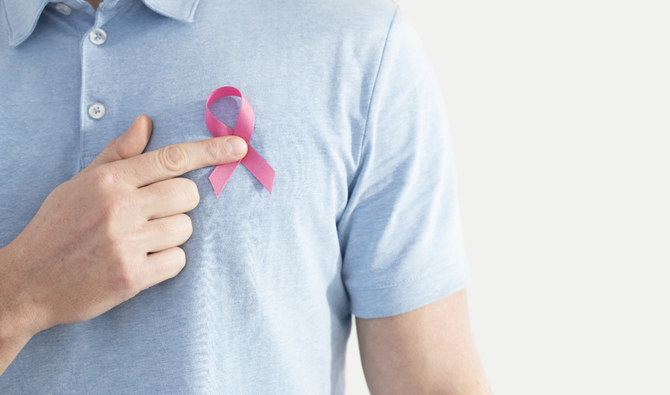
- While cases among males are rare, the illness follows the same path as in women
Arab League Educational, Cultural and Scientific Organization meetings begin in Jeddah

- Participants discuss challenges Arab nations face in fields of education, culture and science, and potential solutions, including knowledge sharing and innovation
- The 121st session of the organization’s Executive Council on Tuesday and Wednesday will be followed on Friday by its General Conference
JEDDAH: Ministers and other representatives from 22 Arab nations gathered in Jeddah on Tuesday for the start of the 121st session of the Executive Council of the Arab League Educational, Cultural and Scientific Organization. The two-day session concludes on Wednesday and will be followed on Friday by the organization’s General Conference.
During the meetings, hosted by the Saudi National Committee for Education, Culture and Science, the participants will discuss important topics, initiatives and proposals related to knowledge sharing, scientific advancement, and innovation within the framework of the work of the organization, the Saudi Press Agency reported.
During the opening session, Hani Al-Moqbel, chairperson of ALESCO’s Executive Council, expressed deep concern about the ongoing crisis Palestinians face as a result of the war in Gaza between Israel and Hamas.
He unequivocally condemned and rejected a senseless and brutal conflict that has claimed the lives of countless civilians, including women, children and the elderly, and denounced as unacceptable the destruction by the Israeli military campaign of hospitals, religious sites, schools, cultural institutions and other infrastructure.
The council, led by its Saudi presidency, expressed its strong condemnation of the continued aggression, occupation and forced displacement in Gaza. Al-Moqbel said that such expressions are not merely procedural or symbolic, they represent a forward-thinking approach to fostering Arab unity, upholding core principles and bolstering shared values. In this way, he added, Arab nations can effectively tackle challenges and overcome hurdles on their paths to advancement.
Mohammed Walad Amar, the director general of ALECSO, highlighted the organization’s commitment to the promotion of the cultural heritage of Arab countries on the global stage. In keeping with this vision, he said, ALECSO has worked with several countries with the aim of securing recognition of more of their cultural treasures on the highly esteemed UNESCO World Heritage List.
As an example of its active engagement in these efforts, he noted that ALECSO took part in the UNESCO Culture and Education Ministers’ Conference in the UAE in February.
Other topics discussed on the opening day included challenges that Arab nations face in the fields of education, culture and science, innovative potential solutions to the problems, and ways to forge new partnerships that can broaden the horizons of education and thinking.
NCWD launches project to evaluate marine species in Arabian Gulf

- Goal behind project is to build baseline for developing integrated management plan for marine environments
- NCWD CEO said project aims to provide basic assessment of the condition of coral reefs
RIYADH: The National Center for Wildlife Development launched on Tuesday a project that aims to assess the state of marine habitats in the Arabian Gulf’s Saudi waters, the Saudi Press Agency reported.
The NCWD said the goal behind the project was to build a baseline for developing an integrated management plan for marine environments, preserving biodiversity and reducing threats.
It will also enhance the sustainability of marine environments in Saudi waters in light of their economic, social and cultural value and their provision of many valuable ecosystem services.
Mohammed Ali Qurban, NCWD’s CEO, said the project aimed to provide a basic assessment of the condition of coral reefs, seagrass meadows, mangrove forests, and associated animals and marine species.
The project will identify natural risks associated with human activities that threaten these coastal ecosystems, and concurrently, find solutions to reduce those threats.
It will also design an effective plan to preserve and rehabilitate these coastal habitats, based on the data provided by the project.
Qurban said Saudi waters in the Gulf cover an area exceeding 27,000 square kilometers and contain very important marine habitats, which support a wide range of marine species.
NCWD’s CEO pointed out that marine systems are exposed to many pressures and require continuous monitoring and the application of an effective plan to preserve and manage them in a sustainable manner.
The data provided by the project constitute an essential factor for conservation and rehabilitation measures and enabling NCWD and other relevant parties to build a management plan to sustain these valuable habitats.
Prince Sultan University hosts panel on space exploration

- Kingdom has already achieved a high-calibre position in space industry, says NASA’s Bill Nelson
RIYADH: Delegations from NASA and the Saudi Space Agency visited Prince Sultan University on Tuesday to engage with students on the future of human missions in space.
A panel session titled “Beyond Earth: Journeys to the Stars,” brought together NASA administrator Bill Nelson and Saudi astronauts Rayannah Barnawi, Ali Al-Ghamdi and Mariam Fardous, to discuss their own experiences in space.
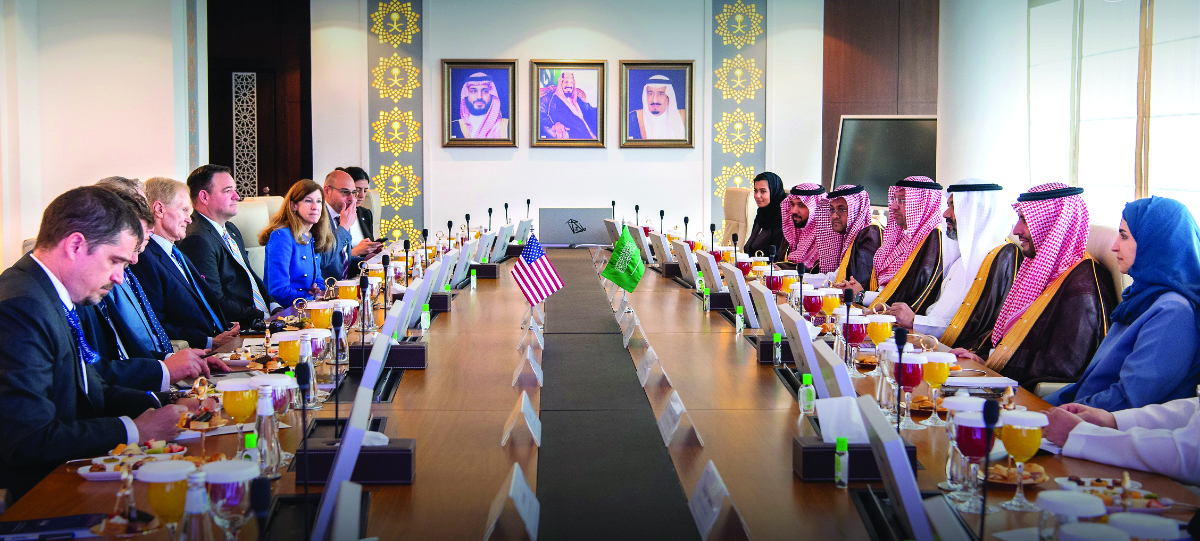
They also debated the future of human missions in space and encouraged the university’s students to be part of the Kingdom’s aspirations in the space field.
Mohammed Al-Tamimi, CEO of Saudi Space Agency, and Ambassador of the US to the Kingdom Michael Ratney, were also present at the reception.
HIGHLIGHTS
• The panel discussion hosted at Prince Sultan University debated the future of human missions in space.
• During his visit to the Kingdom, Bill Nelson also met Munir Eldesouki, president of King Abdulaziz City for Science and Technology.
In an interview with Arab News, Nelson highlighted the importance of space missions. “When we go into space, we have to invent and create new things and that helps us advance our standard of living here on the earth,” he said.
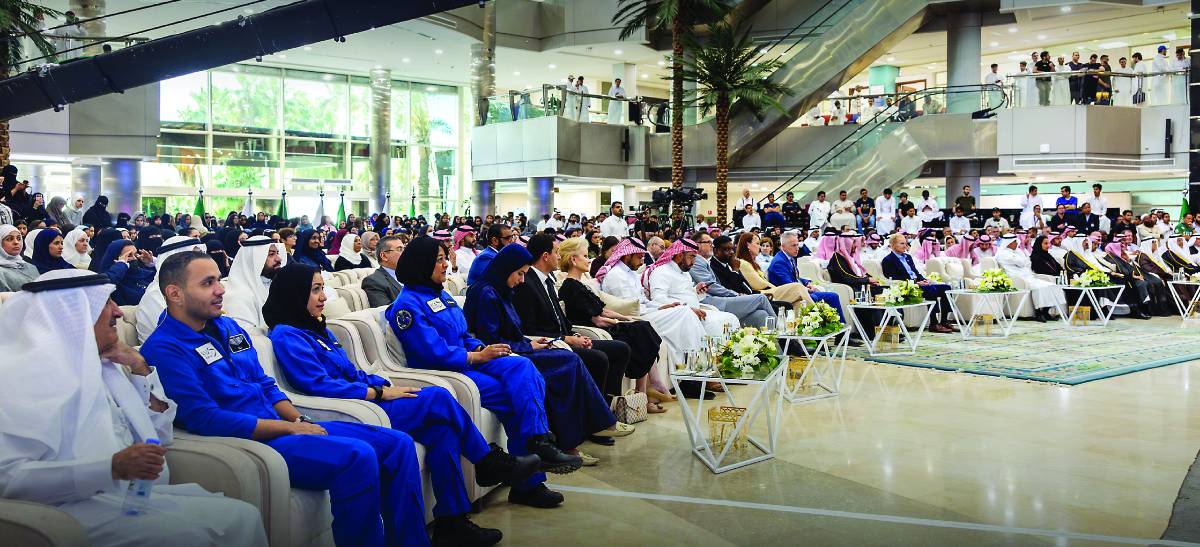
“One of the good examples that I gave in the speech today is the camera in your cell phone, that was developed by NASA. It’s a camera on a chip … there are so many technological outgrowths and spinoffs from our developing space technology.”
Nelson said that there would be further developments in the near future in pharmaceutical research and zero gravity on the International Space Station.
When we go into space, we have to invent and create new things and that helps us advance our standard of living here on the earth.
Bill Nelson, NASA administrator
“There are going to be some major breakthroughs, and already have been on developing drugs, for the cure of diseases. So, there’s a lot of excitement in the future,” he said.
Saudi Arabia has already achieved a high-calibre position in the space industry, he said.
Ahmed Yamani, president of Prince Sultan University, said that it had established a new college of space and aviation with the cooperation with the Saudi Space Agency and Al-Tamimi.
“We went through the process of the initiating this college, which is really based on what we already have … we have a program, aviation management, that was established with Embry-Riddle Aeronautical University in Florida.”
Yamani said that the university was already building the foundation of the space and aviation program with “external consultants that are working with us on both department and both programs. So, we want to definitely touch on the latest and the update updated programs in these areas.”
During his visit to the Kingdom, Nelson also met Munir Eldesouki, president of King Abdulaziz City for Science and Technology, and discussed ways to deepen cooperation in the space sector.
Chairman of the Saudi Space Agency Abdullah Al-Swaha held talks with Nelson in the presence of Al-Tamimi, and they discussed strategic partnership in the field of space to serve humanity.
The Saudi Space Agency is responsible for developing and growing its space sector with a focus on supporting economic growth, stimulating innovation and scientific research.
Saudi Arabia takes part in Netherlands Geospatial World Forum as strategic partner

- The authority is collaborating with the World Bank to conduct studies on the economic impact of geospatial information in Saudi Arabia
RIYADH: Saudi Arabia’s General Authority for Survey and Geospatial Information is serving as a strategic partner in the Geospatial World Forum, a global event with more than 300 speakers specializing in geospatial information.
Themed “Geospatial Transition: Powering the World Economy,” the four-day forum is taking place in Rotterdam, the Netherlands, until May 16.
GEOSA represents the Kingdom at home and abroad in the geospatial sector.

The Rotterdam forum provides a platform to exchange knowledge and unveil smart solutions provided by geospatial information, and includes more than 55 pavilions showcasing the latest technology in the sector.
During the opening session, Mohammed Al-Sayel, president of the authority, said in a speech that geospatial information is playing an important role in decision-making within the rapidly growing Saudi economy.
FASTFACT
Geospatial World Forum held in Rotterdam provides a platform to exchange knowledge and unveil smart solutions provided by geospatial information.
The authority is collaborating with the World Bank to conduct studies on the economic impact of geospatial information in the Kingdom, he added, highlighting work with international organizations concerned with geospatial information management specifications, standards and governance.

Al-Sayel said that the Kingdom, represented by GEOSA, has contributed to the development of geospatial information management globally by hosting the UN Global Geospatial Ecosystem Center of Excellence in Riyadh. The center allows experts to exchange expertise and knowledge within the geospatial information management sphere.
The Kingdom has built and maintained national geospatial infrastructure according to the best international practices, he added, in addition to working on developing national capabilities in the sector.
During a session titled “Geospatial Transition Driving Economic Value in Various Sectors,” GEOSA spokesperson Fatma Al-Shammari said that the Kingdom is undergoing a “significant transition” in various developmental fields, with major projects benefiting from advanced geospatial technologies to achieve national targets.
On the sidelines of the forum, the Kingdom, represented by GEOSA, took part in an accompanying exhibition with its main pavilion as a strategic partner, showcasing Saudi Arabia’s national geospatial infrastructure to visitors and introducing the most prominent development projects in the country.
The exhibition covered hydrographic surveying, national geodetic infrastructure and map production.
Exercise to deal with environmental emergencies starts in Tabuk region
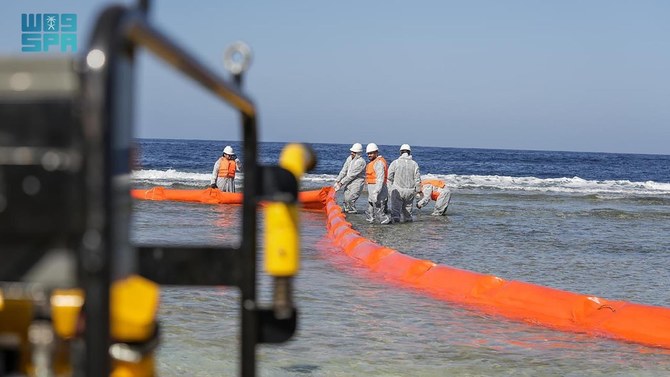
- Exercise is being supervised by the National Center for Environmental Compliance and is taking place in cooperation with 39 governmental and private agencies
RIYADH: An exercise aimed at raising readiness to confront environmental emergencies or oil spill incidents kicked off on the Tabuk coast on Tuesday.
The two-day exercise, called “Response 14,” is part of the Kingdom’s plan to combat pollution of the marine environment with oil and other harmful substances, Saudi Press Agency reported.
The exercise is being supervised by the National Center for Environmental Compliance and is taking place in cooperation with 39 governmental and private agencies.
The center’s official spokesman, Saad Al-Matrafi, revealed that the readiness of each participating agency increased every time such an exercise was held.
He added that there was a noticeable development in the technology being used by the various participating agencies as well as the skills of their employees, as a result of such exercises.
He explained that the exercise is being carried out in several stages in which satellites and advanced simulation programs are used.
Participants will learn how to deal with simulated scenarios of pollution spreading in the middle of territorial waters and its impact extending to coasts and marine habitats.
They will also learn how to contain this pollution and reduce its negative effects on the marine environment and the region’s economy.
Al-Matrafi said the national plan to combat oil spills and harmful substances has succeeded in testing its ability to contain a spill of 75,000 barrels, with a high response rate not exceeding 50 minutes, through the largest fleet of naval units designated for this purpose, in addition to specialist aircraft.



